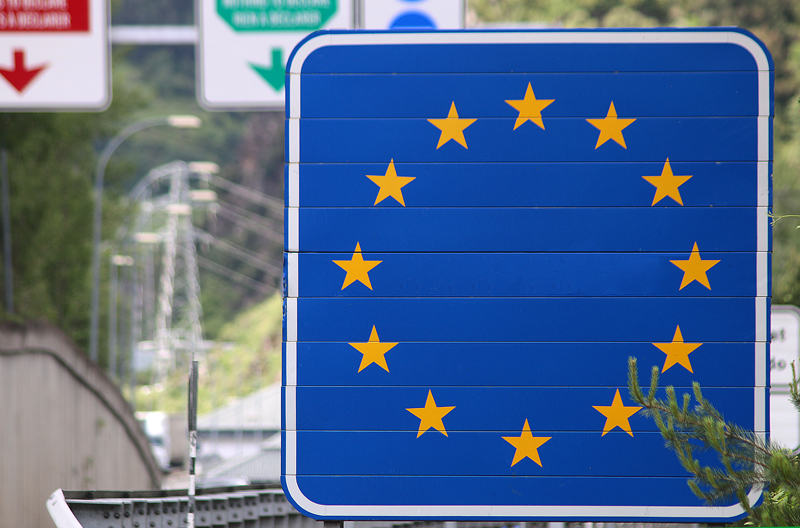If you reside in the United States and were hoping to visit Europe in the near future, forget about it, as the temporary restrictions which are in effect due to the current 2019 Novel Coronavirus pandemic have not yet been lifted on travel to the European Union which is not considered essential.
Restrictions of United States Residents Not Lifted Yet By Council of the European Union

The Council of the European Union adopted this recommendation on Tuesday, June 30, 2020 pertaining to the gradual lifting of the temporary restrictions on travel to the European Union which is not considered essential. The easing of travel restrictions at the external borders of countries which are members of the European Union for residents of the following 14 countries is in effect as of Wednesday, July 1, 2020:
- Algeria
- Australia
- Canada
- Georgia
- Japan
- Montenegro
- Morocco
- New Zealand
- Rwanda
- Serbia
- South Korea
- Thailand
- Tunisia
- Uruguay

Residents of Andorra, Monaco, San Marino, and the Vatican are considered as residents of the European Union for the purpose of this recommendation — as are residents of countries which are associated with the Schengen Area of Europe but are not members of the European Union, which include Iceland, Lichtenstein, Norway, and Switzerland.
Travel restrictions will also be eased for residents of China, subject to confirmation of reciprocity — meaning that only if or when China lifts its travel restrictions against residents of Europe.
The aforementioned list will be reviewed and updated as necessary every two weeks — which means that the next update is expected on Tuesday, July 14, 2020.
Criteria and Conditions for Easing of Travel Restrictions

Countries are listed within the recommendation based on certain criteria and conditions — including the epidemiological situation and containment measures — such as physical distancing as one examples — as well as economic and social considerations; and the criteria and conditions are applied cumulatively in determining which countries are added to the list of easing travel restrictions to their residents.
Regarding the epidemiological situation, countries to be listed should meet the following criteria — in particular, the:
- Number of new cases of the 2019 Novel Coronavirus within the past 14 days and per 100,000 inhabitants close to or below the average of the European Union as of Monday, June 15, 2020
- Stable or decreasing trend of new cases over this period in comparison to the previous 14 days
- Overall response to the current 2019 Novel Coronavirus pandemic — taking into account available information, including on aspects such as:
- Testing
- Surveillance
- Contact tracing
- Containment
- Treatment
- Reporting
- The reliability of the information and — if necessary — the total average score for International Health Regulations
- Information provided by delegations of the European Union pertaining to these aspects
- Reciprocity, which should also be taken into account regularly and on a case-by-case basis
Three Exceptions to the Temporary Travel Restrictions

For countries which the temporary travel restrictions continue to be in effect, the following categories of people should be exempted from those travel restrictions:
- Citizens of the European Union and their respective family members
- Third-country nationals who qualify under the Long-Term Residence Directive of November 25, 2003 of the European Union and their respective family members — who are:
- Long-term residents
- Persons deriving their right to reside from other directives of the European Union or national law
- Persons who hold national long-term visas
- Travelers with an essential function or need, as listed in the recommendation
List of Functions Which are Considered Essential

People who are considered to perform functions which are essential by the European Union — as per this communication from the European Commission on Monday, March 16, 2020 — include:
- Healthcare professionals
- Health researchers
- Elderly care professionals
- Frontier workers
- Transport personnel engaged in haulage of goods — as well as other transport staff to the extent necessary
- Diplomats in the exercise of their functions
- Staff of international organizations in the exercise of their functions
- Military personnel in the exercise of their functions
- Humanitarian aid workers in the exercise of their functions
- Passengers in transit
- Passengers traveling for imperative family reasons
- Persons in need of international protection or for other humanitarian reasons
Next Steps

The aforementioned recommendation by the Council of the European Union is not a legally binding instrument. The authorities of the member states of the European Union remain responsible for implementing the content of the recommendation. They may — in full transparency — lift only progressively travel restrictions towards the countries which are officially listed in the recommendation.
Although a country which is a member of the European Union should not decide to lift the travel restrictions for third countries which are not officially listed in the recommendation before this has been decided in a coordinated manner, countries such as Italy, Portugal, and Greece are already allowing residents of the United States within their borders under circumstances which are significantly less restrictive — but countries which choose to enforce their own travel restrictions and recommendations may encounter internal border controls until the current 2019 Novel Coronavirus pandemic has officially subsided.
This list of third countries will likely be reviewed every two weeks and may be updated by the Council of the European Union — as necessary — after close consultations with the European Commission and the relevant agencies and services of the European Union following an overall assessment based on the aforementioned criteria.
Travel restrictions may be totally or partially lifted — or reintroduced — for a specific country which is already listed according to changes in some of the conditions; and in the assessment of the epidemiological situation as a consequence. If the situation in a listed country worsens quickly, rapid arrival of a decision is expected to be applied.
Conditions which may influence a change in the status of travel restrictions for residents of a country outside of the European Union include the:
- Number of new cases of the 2019 Novel Coronavirus within the past 14 days and per 100,000 inhabitants close to or below the average of the European Union as of Monday, June 15, 2020
- Stable or decreasing trend of new cases over this period in comparison to the previous 14 days
- Overall response to the current 2019 Novel Coronavirus pandemic — taking into account available information, including on aspects such as:
- Testing
- Surveillance
- Contact tracing
- Containment
- Treatment
- Reporting
- The reliability of the information and — if necessary — the total average score for International Health Regulations
- Information provided by delegations of the European Union pertaining to these aspects
- Reciprocity, which should also be taken into account regularly and on a case-by-case basis
Background
The European Commission adopted a communication on Monday, March 16, 2020 which recommended a temporary restriction of all non-essential travel from third countries into the European Union for one month. Heads of state or government of the European Union agreed to implement this restriction on Tuesday, March 17, 2020. The travel restriction was extended for a further month respectively on Wednesday, April 8, 2020, and Friday, May 8, 2020.
On Thursday, June 11, 2020, the Commission adopted a communication recommending the further extension of the restriction until Tuesday, June 30, 2020 and setting out an approach for a gradual lifting of the restriction on non-essential travel into the European Union as of Wednesday, July 1, 2020. Discussions have since then taken place between member states on the criteria and methodology to be applied.
Whether you are admitted into a country which is a member of the European Union may depend on the discretion of the agent whom you encounter at passport control — unless you arrange for written permission or a visa in advance.
Summary

Although residents of the United States will have to wait every two weeks to find out when visiting countries which are members of the European Union will be permitted again, that likely will not happen until the number of cases of the 2019 Novel Coronavirus is reduced in the United States…
…and the residency of the visitor — not necessarily the official passport itself of the visitor — is apparently the determinant of who will be allowed into countries which are members of the European Union. For example, citizens of the United States who reside in countries which are officially on the list of countries which are recommended to ease travel restrictions will likely be allowed to visit.
All photographs ©2018 by Brian Cohen.

